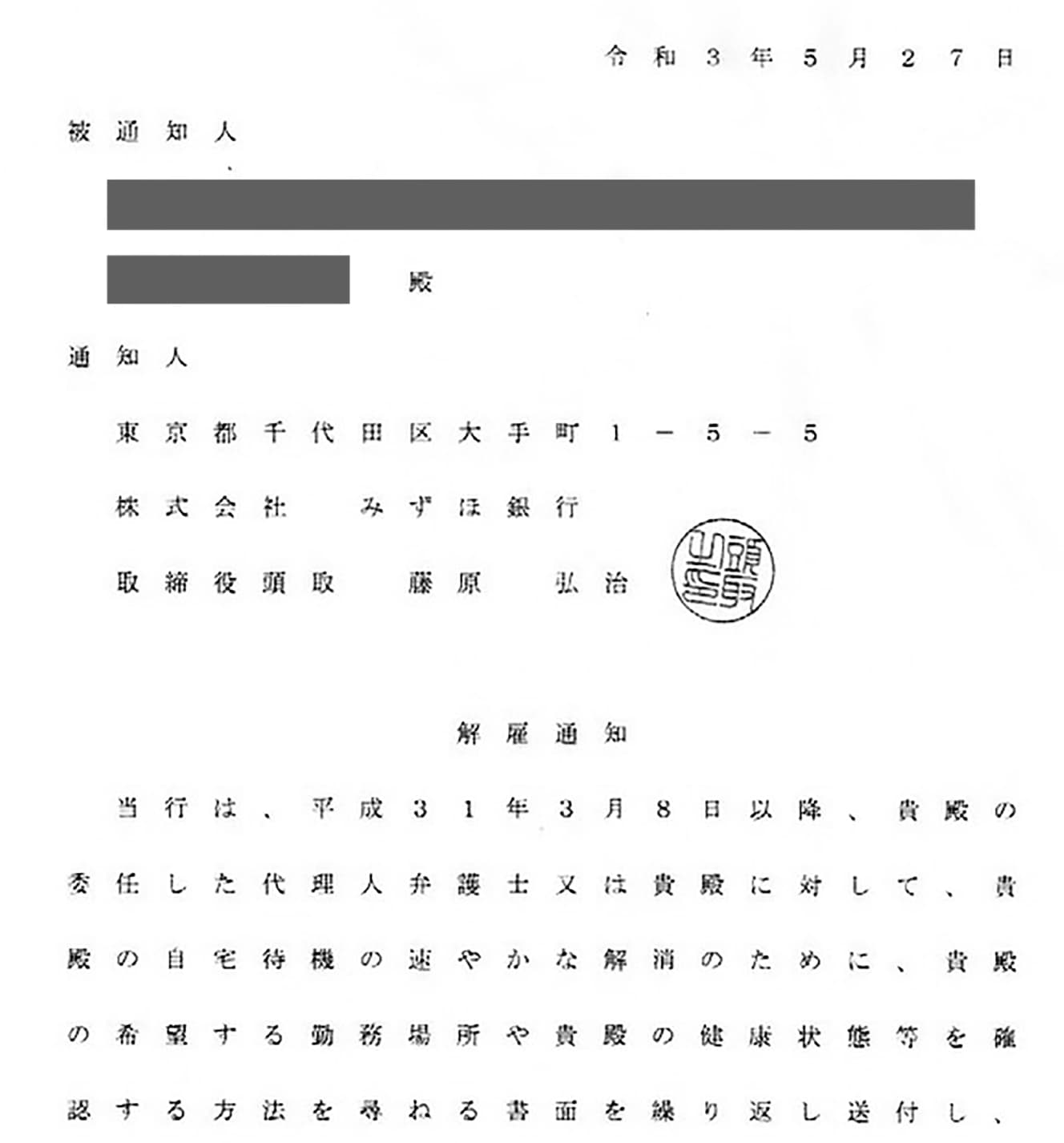“Former Mizuho employee sues bank for damages after being kept at home for more than five years
"A single email to a department manager changed my life as a corporate employee, who had received numerous internal commendations, and forced me to resign after being reassigned. ...

“I didn’t do anything wrong or break any laws. I did not commit any wrongdoing or violate any law, but I was illegally ordered to stay at home for more than five years without any clear explanation.
That’s what Mr. A, 52, who was an employee of the megabank Mizuho Bank until May of this year, told me.
In 2007, Mr. A, who had been working at a regional bank, applied for a limited employment opportunity at Mizuho Bank in the Kansai area and changed his job. After changing jobs, Mr. A was an excellent salesperson who received several internal awards. In December 2002, while working as a deputy manager at the Kyoto branch, his career took a dark turn when he sent an email.
According to Ms. A, Mr. X, a sales manager from the former Industrial Bank of Japan, used to read a newspaper with his legs crossed wide open in a place where customers could see him during business hours. When a customer complained, Ms. A asked her immediate supervisor to check the content of the e-mail and sent it to Mr. X, asking him to refrain from showing such attitude to customers, with the branch manager and deputy branch manager as CCs.
“What happened next was that the executive director in charge of the Kansai region showed up at the branch and called the branch manager and others. In addition, three or four personnel from Tokyo came to the branch, and the “on-site” meeting began, and my supervisor and colleagues were interviewed. When everyone came out of the conference room, they saw my face and went back to their seats. But I was not called. I still remember well that when I passed Mr. X in the corridor later, he whispered to me, ‘Remember me. And three months later, I was called to Tokyo.
In March 2003, at the headquarters in Otemachi, Tokyo, Ms. A was pointed out by a counselor in the human resources department that her attitude toward Mr. X was rude.
“In July, I was removed from my sales position and reassigned to an administrative position in Osaka. Immediately afterwards, I was called to the personnel department in Tokyo and warned, ‘I’ll tolerate you this time, but if you do it again, you know what to do. At that time, on the way to the elevator on the way home, the HR staff said, “Everyone thinks Director X’s behavior is strange,” and “It’s the other party’s fault. But as long as he’s at Mizuho, you know.
In March 2004, Mr. A was again summoned to the Human Resources Department in Tokyo and told, “Please quit the company.
In March 2004, Mr. A was again summoned by the personnel department in Tokyo and told, “Please quit the company. From now on, please look for a job.
Over the course of a year and two months, Mr. A was summoned to Tokyo and Osaka a total of 11 times to meet with two executives from the human resources department in a private room. The total time was over 14 hours.
“He was told, “If you continue like this, we will make you an administrative staff member in Tokyo who will do the same work over and over again.
Ms. A testified that the Human Resources Department persistently tried to force her to resign.
On the other hand, on April 7, 2004, Ms. A was verbally ordered by the personnel department to stay at home and was not allowed to go out from morning to evening, except for the library, except for job hunting. This lasted for more than five years. Moreover, as of April 1, 2005, she had been transferred to Tokyo, and it was at a meeting with the personnel department on May 10 of the same year that Ms. A learned of this.
“I was hired only for the Kansai area, but I was told, ‘I’ve been transferred to Tokyo. I was hired only for the Kansai area, but they said, ‘You have been transferred to Tokyo. They made me fill out a (courier) slip and pack my personal belongings in a box, and a few days later, I was told to return my entrance card.
After that, Ms. A tried to report the incident internally via e-mail, but the situation did not improve, and on the contrary, she received a series of disciplinary actions and was dismissed on May 27 this year.
On September 9, Mr. A made up his mind and filed a civil suit against Mizuho Bank in the Tokyo District Court, seeking invalidation of his dismissal and compensation for damages.
“At first, no one believed my story. At first, no one believed my story, saying that there was no way such a thing could happen at a large company like Mizuho. I had no idea that sending the e-mail to Mr. X would lead to such a situation. The first priority was to file a lawsuit and make it public. Maybe I am not the only one who has been treated unreasonably. We will seek to uncover the truth, apologize, and prevent any recurrence.
Naoto Sasayama, the lawyer representing Ms. A, pointed out that, “In such a short period of time, there were no options other than resignation.
“We believe that this is enough to be judged as coercion to resign from the company. Also, forcing her to stay at home for years without showing her a way to return to work would be considered unjustified personal detention.
Ms. A’s hair, which used to be pitch black, has turned completely white over the past five years. Meanwhile, Mr. X is now a managing executive officer of Mizuho Bank.
I sent a letter of inquiry to the bank’s public relations office regarding the civil suit filed by Mr. A, but they only replied, “We will consider our response policy after reviewing the complaint. As for the coercion to resign, they refrained from answering, saying, “We need to protect his privacy.
Mr. A’s story is like the world of “Hanzawa Naoki. No, the reality is even worse.



From the September 24, 2021 issue of FRIDAY
Reporting by: Keitaro Tanaka (freelance journalist) PHOTO: Kei Kato (1st photo) Kyodo News (2nd photo)